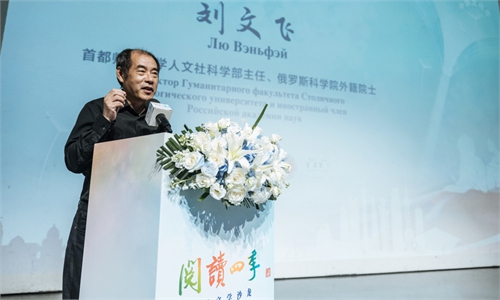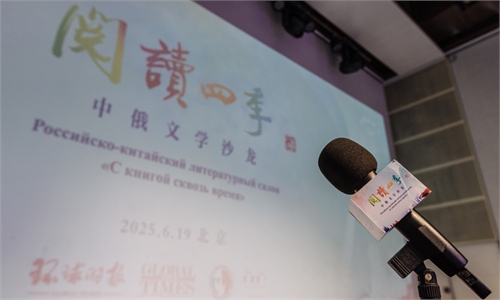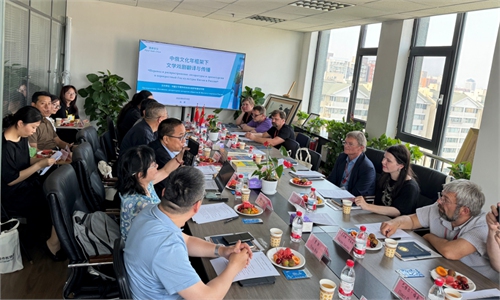ARTS / CULTURE & LEISURE
Literature as a bridge: Deepening China-Russia cultural exchange through poetry
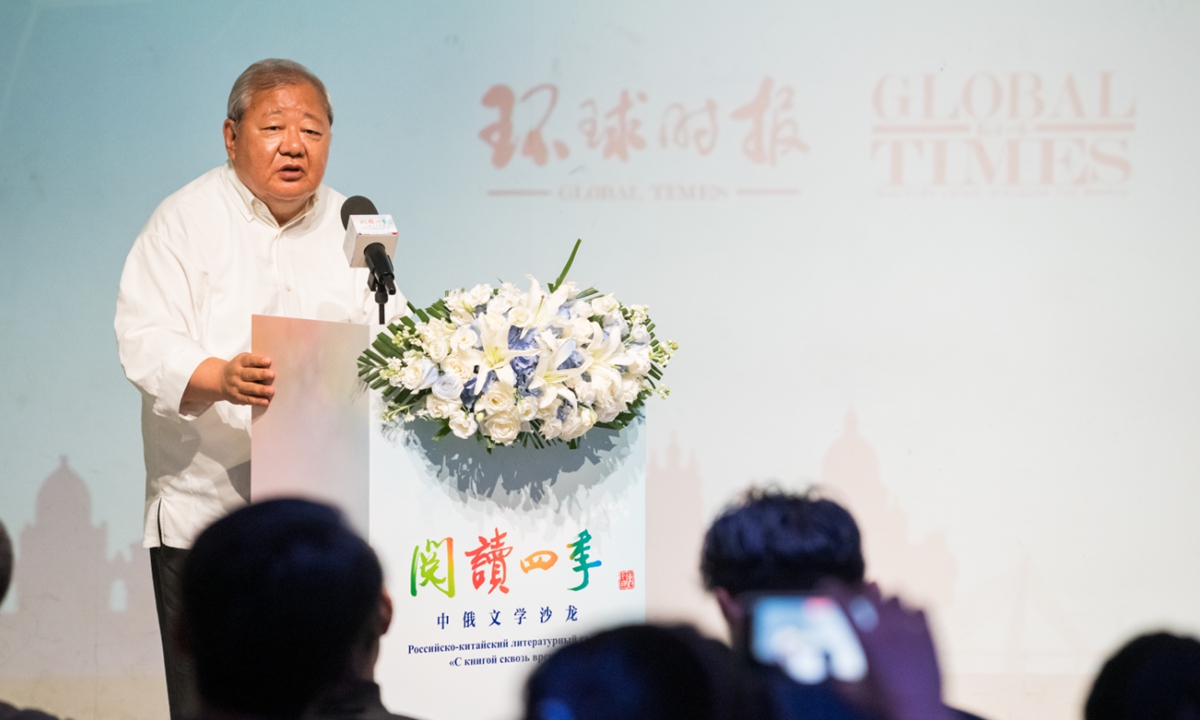
Jidi Majia Chen Tao/Global Times
Editor's Note:
Against the backdrop of the "China-Russia Years of Culture," the "Reading through the Seasons" China-Russia Literature Salon was held by the Global Times and the Russian Cultural Center in Beijing on Thursday with the participation of renowned experts in Chinese and Russian literature. Jidi Majia, a renowned poet and former vice chairman of the China Writers Association, attended the event, during which he emphasized that the deep poetic connection between China and Russia has brought the two great nations closer together on a spiritual level. This article is based on the poet's speech at the event.
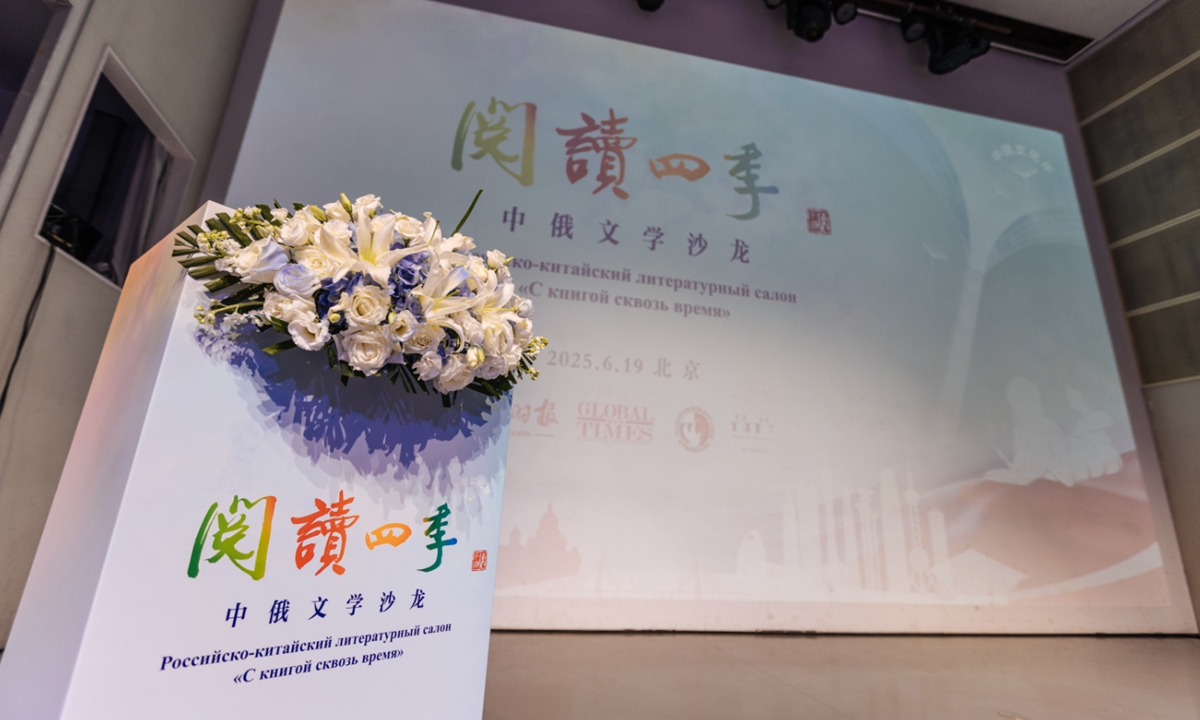
A scene at the "Reading through the Seasons" China-Russia Literature Salon Photos: Chen Tao/Global Times
In today's world, as global civilizations engage in ever broader exchanges, I firmly believe that literature remains a critical cornerstone for mutual understanding. Literature, in my view, is not merely an artistic endeavor; it embodies the very spiritual core of different cultures and civilizations. Across thousands of years and among every nation, literature - especially poetry - has always been the highest form of linguistic and cultural expression. Today, as I join Russian writers in conversation, I am deeply honored by this rare opportunity to share and reflect on our intertwined literary destinies.China and Russia have long enjoyed a special relationship in the realm of literature. Particularly since the 20th century, our two countries have maintained some of the closest literary ties worldwide. While historical factors have certainly played a part, I believe the most profound foundation for this connection is our ongoing literary exchange, especially in poetry.
Our senior generations of writers and translators, such as Lu Xun, Mao Dun, and the renowned translator Ge Baoquan, worked tirelessly to bring Russian masterpieces - especially those of Pushkin - into the Chinese language. Thanks to their efforts, Russian poetry has deeply influenced the evolution of Chinese literature.
When I reflect on modern Chinese poetry, I see two principal sources. The first is our native tradition, rooted in ancient Chinese classic Shi Jing (The Book of Songs) and the poetic legacy of Qu Yuan. These ancient forms, expressed in classical Chinese, have shaped our literary sensibilities for millennia. The second, equally important, is the influence of foreign poetry. Of all these external forces, Russian poetry - particularly the works of Pushkin - has left an indelible mark on Chinese verse.
Over the past century, Russian poetry has profoundly shaped the rhythm and spirit of Chinese poetry. While English and Spanish poetry have also influenced us, it was Russian verse that first entered China on a large scale, becoming a dominant reference point for generations of Chinese poets.
My own journey as a poet was shaped by Russian literature. I began writing poetry in the 1980s, but my true awakening came at the age of 16, when I first encountered Ge Baoquan's translation of Pushkin's poetry. The book had been passed through many hands, and by the time it reached me, its cover was long gone. Yet its contents stirred me deeply, awakening my spirit and inspiring me to write poetry myself. I was amazed by the beauty and depth that poetry could embody.
Years later, when I finally met Ge, I told him how grateful I was that he had brought the works of such a great Russian poet to Chinese readers. Growing up amid China's southwestern mountains, I rarely had the chance to read such books. This encounter made me feel a genuine spiritual kinship with Russian poets.
Over the decades, this literary connection has grown stronger. Many Chinese translators, such as Fei Bai, Gu Yu, and Professor Liu Wenfei, have played crucial roles in bringing Russian poetry into the Chinese literary world. Since the 1950s, many Russian poets' works have been translated, leading to a vibrant, ongoing dialogue between our two traditions.
I am particularly pleased that in recent years, the works of many contemporary Russian poets have found their way into Chinese. For example, at the Qinghai Lake International Poetry Festival - which we have held annually since 2007 - many influential Russian poets have visited China. In 2015, we awarded the Golden Tibetan Antelope Poetry Prize to Alexander Kushner, who represents the Silver Age tradition and the Petersburg school of Russian poetry. Kushner's visit and subsequent literary exchanges deepened our understanding of the modern Russian poetic tradition.
Thanks to the efforts of translators like Professor Liu, Kushner's works have been widely read in China, sparking direct discussions among poets and scholars about the nuances and unique sensibilities of Russian verse.
Translation, I believe, is at the heart of our cultural exchange. It is not merely a matter of linguistic accuracy - it is a creative act that requires both poetic and cultural sensitivity.
While technology such as artificial intelligence (AI) are changing the landscape of translation, I am convinced that poetic translation will remain fundamentally human. AI cannot replace the subjectivity and empathy of the poet - the sense of personal fate, the compassion for others, the longing for freedom, and the dream for humanity's future that poetry embodies. The background, experiences, and emotions of the poet are deeply interwoven into every poem.
I want to take this opportunity to express my sincere appreciation to all the translators engaged in China-Russian literary exchanges. Their work is not just about communication; it is a creative endeavor that constructs vital bridges between our cultures. I am equally grateful to the organizers of these literary events and forums, such as the Global Times and Russian Cultural Center, who make these exchanges possible.
The author is a renowned Chinese poet and former vice chairman of the China Writers Association
